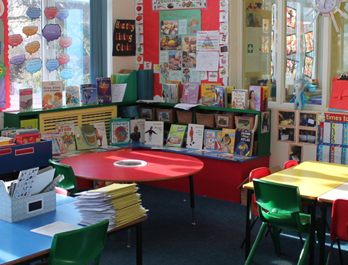
The Background
Nayland Primary School is a one-form entry community LEA Primary School in the centre of a beautiful rural village in Suffolk, seven miles north of Colchester, on the banks of the River Stour. The school is proud to say that children are genuinely their priority, and they look after around 210 pupils aged 4 to 11, attracted from a mixed catchment area from several local villages, served by a LEA school bus.
Like many similarly sized schools, Nayland work with a trusted local IT advisor. As the lockdown took hold, it was they who recommended to the school to invest in RM Unify, as a way to extend their remote learning capability – given that it works seamlessly with Microsoft products such as OneNote – which is how the school had been setting their online learning at that point.
Responding to the challenge
When the Coronavirus lockdown came towards the end of March 2020, it came quickly, and somewhat unexpectedly, for every school in the country. Nayland Primary were no different.
“We only started preparing once we knew schools in other countries were closing. Before this we did not have anything in place. Our IT advisor recommended OneNote so we began to look into this the week before lockdown and just managed to get it up and running for the second week of school closure.”
Katie Coburn, Deputy Headteacher
Like most schools, Nayland Primary remained open for the whole outbreak – initially for the children of key workers (roughly 15 pupils) and then for the return of Reception, Year 1 and Year 6, as the rules were relaxed and these pupils were encouraged to return. By the end of the summer term all but 3 pupils in these classes had returned. Importantly, the classes that were not yet allowed to return were welcomed back for one day at the end of t erm.
The school had an app in place which they used for communication and links to helpful websites. Key Stage Two pupils were encouraged to use websites such as MyMaths, but this was the limit of what they could offer for online learning. Children did not have email accounts or a way to communicate with staff, although parents did have class email addresses. The school had not used Microsoft Teams before or any online lesson plans. That said, they had moved their school files to the cloud a year earlier, and these were already being used by staff (admin, SLT and teachers) at home and in school.
Their local IT advisor came to the school early in lockdown and recommended the new scheme that the DfE had announced, via which the Government would provide expert technical support for schools to set up an accredited digital education platform. Like most schools, budgets were tight – especially after having to pay for things due to the pandemic which were clearly unbudgeted – so the offer of a fully funded solution to a problem they were seeking to address, was a large factor in deciding to apply.
Nayland Primary submitted their application in the middle of May, and little more than a month later, RM had got them up and running with Microsoft Teams – organising classes online, distributing and receiving assignments, as well as holding virtual face-to-face conversations with pupils, their parents, fellow teachers, and even full Governor meetings.
“We now have an online learning platform that we didn’t even plan to implement at this point, with a way to teach remotely as the new term starts. We are future proofed for whatever the national picture looks like over the next few months/ years. Microsoft Teams has exceeded all my expectations.”
Katie Coburn, Deputy Headteacher
Practical implications of remote learning
Without a manual to follow or a script to implement, when the lockdown came, it forced every school, teacher, senior leader and admin person to look again at what they did, and how they did it.
“Online teaching is a whole new ball game!”
Katie Coburn, Deputy Headteacher

It is difficult to differentiate learning and understand fully how children respond to different tasks. Parent engagement is a big factor and at Nayland School, they found they had to reinvent their learning to keep everyone engaged. It became particularly difficult when some children returned and others did not and then staff were required to set online learning along with classroom based teaching, ensuring children gained a similar experience and equality was maintained.
It is fair to say that parents took several weeks to adjust, but when they did, they were quickly able to download, complete and upload their child’s learning. Older children were able to do this independently and engage with teachers and each other using the collaboration space on MS Teams. RM Unify allowed them to put all their online resources (e.g. website links) and their online learning in one place which makes things much easier for parents. Children particularly enjoyed the “tile” approach that is central to how RM Unify works, finding it similar t o some of the devices they use at home.
Whilst this proved very positive, the first few weeks were difficult, as staff were learning at the same time as parents and both parties had to learn as they went to be able to put in place the right approach for home learning.
“It has not been easy as teaching does not give you much time to learn new skills. Our school are planning for almost all of our school development days to be technology based next academic year.”
Katie Coburn, Deputy Headteacher
For most, lockdown meant that schools and their staff had little choice but to embrace the technology that was available, and Nayland – like many – feel that this is the start of a longer-term recognition of the important role of technology within schools.
“Many teachers have upskilled already during the pandemic and I think that schools will need to prepare in case a similar situation occurs again. We have secured lots of new skills already and we plan to build on these over the coming months.”
Katie Coburn, Deputy Headteacher

The Benefits
For Nayland Primary, Microsoft Teams has helped them stay in touch with their school community, as well as to support home learners. In particular it has led to greater engagement with parents and children at home.
“Microsoft Teams is such an easy platform for parents to use, children see it as something familiar, and it is a much quicker way for teachers to access the information and communication tools that they need. That said, we still have lots to learn!”
Katie Coburn, Deputy Headteacher
The Lessons Learnt
- Just take a deep breath and go for it – you’ll learn along the way. For many years schools have put off investments like technology, referring to very real challenges such as budgets, skill sets and priorities. However, for those – like Nayland School – that have taken the plunge, the benefits really do outweigh many of these reservations.
- You are not alone! Whether you have an IT advisor, or simply want to refer to similar schools who are going through the same challenges – there are people out there who can help. This Case Study is one way that you can discover how some schools have approached the pandemic, and how you can learn from them – even if next time it is a flood, a fire or simply a bad winter.
- Engagement is everything. One thing that Remote Learning platforms bring, is the ability to keep in touch with all stakeholders – pupils, teachers, parents and the wider community. It is a great way to keep everyone in the picture during times of great change and uncertainty.
The Legacy
Whilst no-one knows when – and even if – we will ever return to what we used to call normality, it is important that we learn from the last three months. As people look back on the lockdown period as a time when everyone rallied together, if we are honest with ourselves, is was a daunting time for everyone, and there is still lots to do. Although schools like Nayland have been setting online learning and responding to children at home, they have only just started their journey into virtual teaching which is the next big step for the school.
“This will have a lasting effect on education and as professionals we need to upskill so we are ready to keep adapting, as each week and term will be different. Whilst increased personal hygiene and cleaning is a priority, time in school will become precious as we begin the journey to ensure pupils can reach their full potential. As such, there will always be a need for online learning.”
Katie Coburn, Deputy Headteacher
Download a PDF of the case study